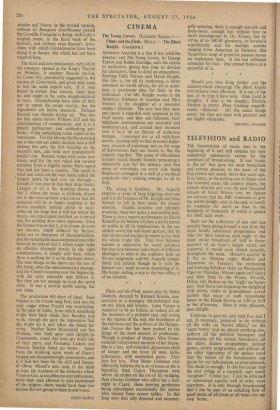TELEVISION and RADIO
THE transmission of music was in the beginning of it and still remains the only completely satisfactory excuse for the invention of broadcasting. It was 'music in the air' that gave the most immediate and certain pleasure to the users of the first crystal sets nearly thirty-five years ago. It is, today, in the putting out of music over the crowded areas, the country places, the remote districts and over the near thousand islands of Great Britain (yes, my figures are correct) that the BBC continues to give the purest delight, and, in the end, to justify its existence—far more se than in the hundreds of thousands of words it speaks for itself each week.
Such are the reflections of one who has recently been giving himself a rest from the more loudly advertised programmes and who has been listening each night to the lesser music broadcasts of half to three- quarters of an hour's length which are scattered, it would seem almost casually, throughout the week. Mozart's quartet in E flat on Monday night; Brahms and Schumann on Tuesday; the enchanting and amusing Schubert Octet on Wednesday; Elgar on Thursday; Mozart again on Friday; and then back to the Proms, Dvorak, Delius and Berlioz on the 'Light' on Satur- day. And this is not forgetting the delightful little piano, violin or gramophone record recitals that occur at such improbable hours in the Home Service as 2.30 or 4.15 in the afternoon. Here is pure pleasure, pure delight.
And if music has been broadcasting's ea test and incontrovertibly most innocent t to the multitude, the effect of broad- ting on the multitude's attitude towards Erusic has been incalculably beneficial. oadeasting, as we are frequently reminded, s in a little over a quarter of a century transformed Britain from being musically- @Peaking the poorest country in Europe into one in which music is as widely and as enthusiastically loved as in any other. It 4. I suggest, not only the great and famous Oneerts, but the small musical broadcasts .at form the regular fare of our daily programmes which have effected this revolu- on. They have helped 'to achieve this ineuite simply by accustoming people at all s of the day to the sound of good music their own homes—and sometimes when ey least expect it. MORAY MCLAREN



































 Previous page
Previous page